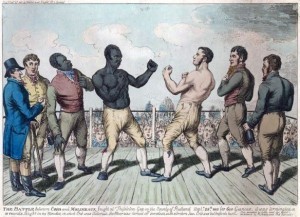Quiz Answers!
Thank you so much to everyone who entered the historical quiz. I hope you had fun with it! Congratulations to the winners, Jami S and Amy, who got all the answers correct! A book is winging its way to you both. Here are the answers:
winging its way to you both. Here are the answers:
1. Dead as a Doornail derives from the solid stud against which the door knocker is struck. This is a very old phrase, the first written example dating from 1350. There are also references to is in Shakespeare. What isn’t clear is why a doornail should be dead.
2. Beyond the Pale originally derived from the park pale, the fence made of stakes that encircled an estate or hunting ground. Within the pale was safe; beyond the pale was wild and barbarous. It has come to mean something that is unacceptable or beyond common standards of decency or morality, an interesting translation of physical safety into moral unacceptability.
3. Coming up to Scratch has its derivation in the boxing ring. In early boxing matches the boxers had to stand with one foot touching a line scratched in the ground before each round. If they failed to do so they lost the fight. This now has the implication of being both ready and also being able to deliver what you have promised.
4. Hoist by his own petard; This implies a certain pleasing irony that something has backfired on someone. The petard is first mentioned in written sources in the 16th century as a form of explosive device. This developed into a siege weapon that used gunpowder. The phrase, like so many others, is first mentioned in Shakespeare.
5. Passing the buck was the answer that everyone got right! Many card games made use of a marker, the buck, to show who had responsibility for dealing. To pass the buck was to pass on the responsibility to the next person.
 6. The derivation of Nineteen to the Dozen refers to a steam powered pump capable of dispelling 19 000 gallons of water every 12 bushels of coal burned. It originates in the Cornish tin and copper mines of the 18th century where the pumps were used to control flooding of the mines.
6. The derivation of Nineteen to the Dozen refers to a steam powered pump capable of dispelling 19 000 gallons of water every 12 bushels of coal burned. It originates in the Cornish tin and copper mines of the 18th century where the pumps were used to control flooding of the mines.
7. There is dispute over the derivation of the phrase ” Son of a gun.” Some say it started as referring to the son of any military man. A more frequently accepted derivation is that the British Navy allowed women (wives and camp followers) to live on naval ships, often sharing with the men hammocks that were slung between the cannon. Any child born on board who had uncertain paternity would be listed in the ship’s log as ‘son of a gun’.
8. Blood and Thunder: Times of Blood and Thunder were times of violence, feud or outright war. The phrase originally started out as an oath, first used in print by Tobias Smollett in 1751 and again by Lord Byron in the poem Don Juan.
So there we are! Thanks again for the entries!
©2012 Nicola Cornick. All Rights Reserved.
.


